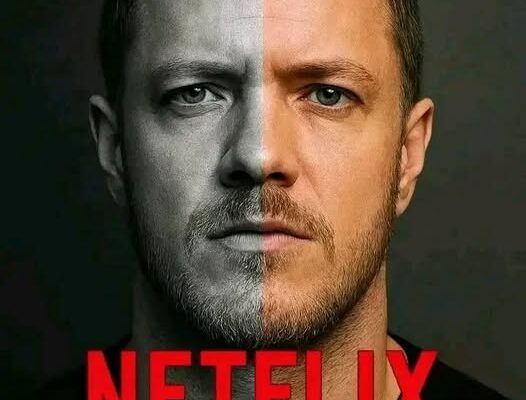Netflix has officially unveiled its newest original documentary, Beyond Belief, a raw and emotionally unfiltered exploration of Imagine Dragons’ frontman Dan Reynolds—an artist often described as modern rock’s most influential and culturally resonant voice. With this release, the streaming giant invites viewers far beyond the familiar arena lights and radio-dominating singles, offering intimate access to a musician whose public persona has long been defined by electric performances, massive hits, and a relentless touring schedule, yet whose private battles have shaped the core of his art in ways rarely seen so openly. The documentary situates Reynolds not as an untouchable rock icon but as a fully vulnerable human being navigating the dual pressures of global fame and personal fragility, peeling back layers of image, expectation, and creative responsibility to reveal the forces that have both fueled and haunted his career.
From the film’s opening moments, Beyond Belief sets a tone far different from typical rock-star documentaries. Rather than beginning with pyrotechnics, crowds, and congratulatory montages, it introduces Reynolds quietly—almost hesitantly—reflecting on the psychological toll of carrying a band that has become synonymous with the soundtrack of a generation. The camera lingers on him without hurry, capturing silences, half-formed thoughts, and the unvarnished humanity of someone who has spent over a decade shaping anthems that millions scream back at him each night. It becomes immediately clear that this is not a highlight reel nor a victory lap; it is a reckoning.
Throughout the documentary, Reynolds allows himself to be seen grappling with the emotional complexities embedded in the success of Imagine Dragons. Their rise to global fame has been meteoric, propelled by megahits such as “Radioactive,” “Believer,” “Demons,” and “Whatever It Takes.” Fans worldwide have embraced the band’s combination of raw vulnerability and thunderous sound, but the film challenges the assumption that such success necessarily equates to personal stability. The larger-than-life persona Reynolds carries onstage is revealed to be a carefully wielded tool—part emotional armor, part creative release—that often masks profound inner turmoil. The documentary confronts the long-standing tension between the public’s perception of him as an invincible powerhouse and the quiet reality of a man wrestling with anxiety, self-doubt, and the weight of feeling responsible for millions of listeners who see his music as a form of salvation.
The filmmakers follow Reynolds through moments of exhaustion while touring, intimate scenes with his family, therapy sessions, studio experiments, and long nighttime conversations that capture the disorienting loneliness that can accompany artistic purpose. Rather than striving for glamor or dramatization, the documentary presents these scenes with an unflinching realism. Reynolds’ daily life unfolds not as a crescendo of dramatic events but as an accumulation of small, humanizing moments that collectively reveal his emotional world. His fears about failing the people who believe in him, his complicated relationship with self-worth, and his struggle to maintain balance in an industry that rarely allows rest are portrayed with care, patience, and honesty.
One of the film’s most powerful elements is its exploration of how Reynolds channels his internal battles into his art. Viewers are granted access to his songwriting process as he approaches lyrics almost like confessionals—raw, open, and sometimes difficult even for him to articulate out loud. The documentary emphasizes that Imagine Dragons’ distinctive sound has always emerged from emotional truth rather than commercial calculation. Reynolds discusses how his adolescence shaped him, how early feelings of isolation and inadequacy eventually evolved into an artistic drive, and how the band’s massive success never fully quieted those inner echoes. If anything, fame amplified them. In one scene, he reflects on the strange contradiction of standing before tens of thousands of people while feeling emotionally exposed, sometimes even empty. It is in these contradictions that the documentary’s emotional core takes shape.
Another major thread in Beyond Belief highlights Reynolds’ activism, particularly his work supporting LGBTQ+ youth who feel marginalized within their communities. The film traces the origins of his LoveLoud festival—a project born from his experiences growing up in a conservative environment and later witnessing the struggles of friends, fans, and loved ones who felt unseen or unsupported. Rather than merely portraying activism as a side project, the documentary frames it as an extension of his emotional identity, a channel through which he confronts his own past and the broader social wounds that resonate with many of Imagine Dragons’ fans. The raw sincerity of this activism, coupled with the emotional and logistical toll it takes, is explored with nuance. Reynolds speaks candidly about the personal responsibility he feels to use his platform meaningfully, even when doing so attracts criticism or pushes him into exhausting territory.
The documentary also dives into Reynolds’ evolving relationship with physical and mental health. His struggles with chronic pain and autoimmune issues—topics he has often touched on publicly—are addressed with depth for the first time in long-form film. Viewers see the invisible strain of performing through pain, balancing treatments, and managing the emotional weight that physical limitations impose on someone celebrated for explosive, high-energy performances. The vulnerability Reynolds displays in discussing his body’s limitations mirrors the emotional vulnerability he brings to the rest of the film, making clear that his personal challenges are not isolated threads but interconnected parts of a complex, ongoing journey toward self-acceptance.
Interspersed throughout the documentary are scenes with Reynolds’ bandmates, family, and friends, offering outside perspectives that enrich the portrait of a man constantly at the intersection of creative passion and personal struggle. Their reflections do not flatten him into archetype or myth; instead, they reveal a network of relationships that both anchor and challenge him. His bandmates speak candidly about the pressures of sustaining a long-running global act, the toll of continuous reinvention, and the emotional responsibility they all feel toward each other. His family members, in turn, offer insight into the duality of loving someone who gives so much of himself to the world while sometimes struggling to preserve enough energy for his own well-being.
What distinguishes Beyond Belief from many music documentaries is its refusal to settle for simplistic narratives. It does not attempt to tie Reynolds’ journey into a clean arc of adversity followed by triumph. Instead, it acknowledges the ongoing, cyclical nature of emotional health, creative burnout, and personal growth. The film positions Reynolds not as someone who has conquered his demons but as someone learning to sit with them, understand them, and occasionally even draw strength from them. This approach resonates with fans who have long connected with the vulnerability in Imagine Dragons’ lyrics, and it invites new audiences to reevaluate the band through a more compassionate and complex lens.
Netflix, for its part, treats Beyond Belief as a centerpiece release, recognizing Reynolds’ unusual influence within modern rock. His voice—both literal and symbolic—has become emblematic of a generation that grapples openly with mental health, identity, and emotional authenticity. In elevating his story, the documentary extends beyond the confines of music fandom and into broader cultural territory. It positions Reynolds as a figure who has become significant not just for his artistic contributions but for his willingness to interrogate the very vulnerability that often goes unspoken in public life.
By the documentary’s conclusion, viewers are left with a profound sense that Beyond Belief is less about closure and more about continuation. Reynolds’ journey is ongoing, shaped by complexities that remain unresolved yet embraced. The film closes not with a triumphant final note but with an honest acknowledgment that growth is messy, healing is nonlinear, and the pursuit of emotional truth is lifelong. Netflix’s production captures that sentiment with striking clarity, offering a portrait of Dan Reynolds that feels not just honest, but necessary—a reminder that even the most powerful voices carry fragility, and that the intersection of art and personal truth is often where the most meaningful stories begin.
If you want, I can tighten this, shift the tone, make it more journalistic, more poetic, or more like a press release—just let me know.



